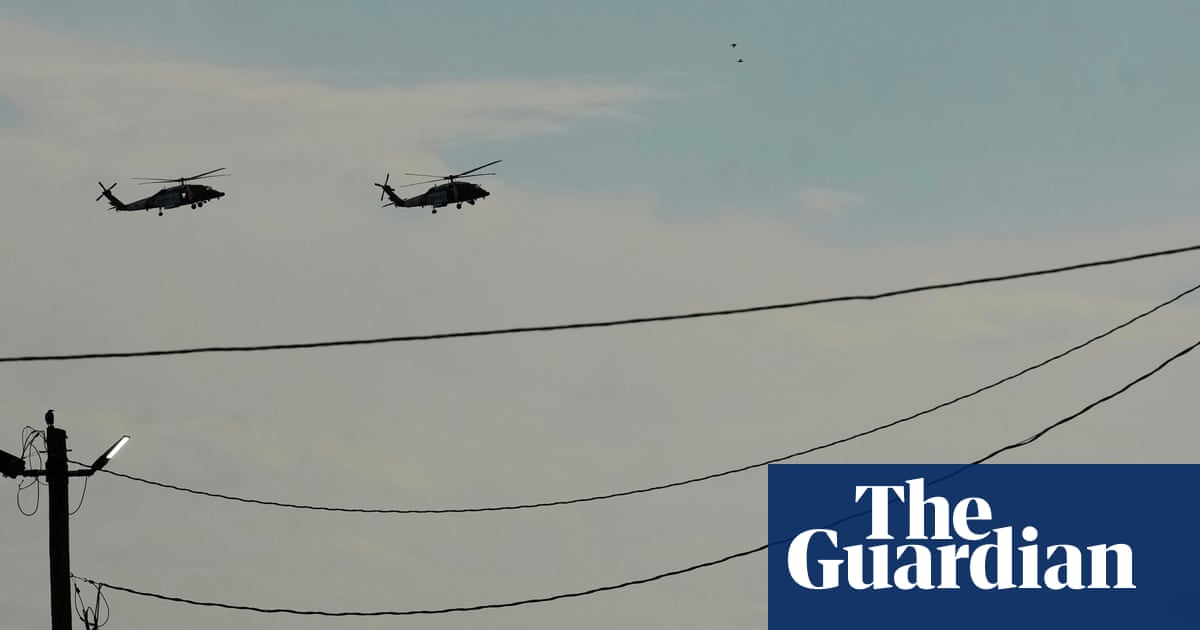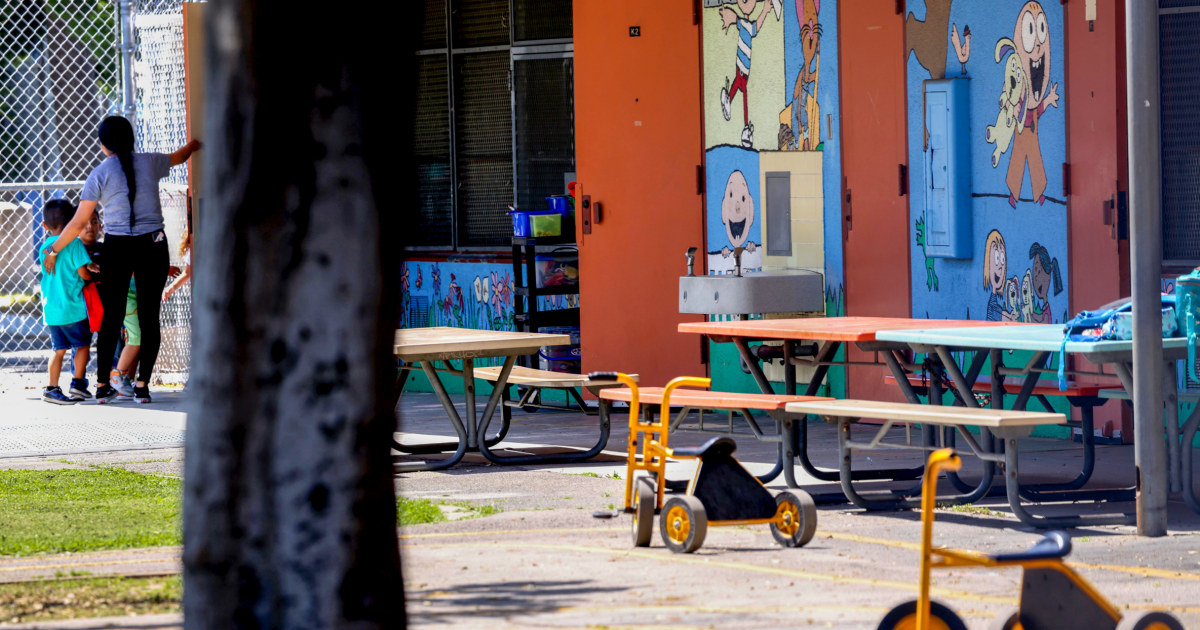Critics condemn reopening of ‘Camp J’ unit at Angola in service of Trump’s nationwide immigration crackdown, noting its history of brutality and violence
There were no hurricanes in the Gulf, as can be typical for Louisiana in late July – but Governor Jeff Landry quietly declared a state of emergency. The Louisiana state penitentiary at Angola – the largest maximum security prison in the country – was out of bed space for “violent offenders” who would be “transferred to its facilities”, he warned in an executive order.
The emergency declaration allowed for the rapid refurbishing of a notorious, shuttered housing unit at Angola formerly known as Camp J – commonly referred to by prisoners as “the dungeon” because it was once used to house men in extended solitary confinement, sometimes for years on end.
For over a month, the Landry administration was tight-lipped regarding the details of their plan for Camp J, and the emergency order wasn’t picked up by the news media for several days.
But the general understanding among Louisiana’s criminal justice observers was that the move was in response to a predictable overcrowding in state prisons due to Landry’s own “tough-on-crime” policies.
Though Louisiana already had the highest incarceration rate in the country before he got into office, Landry has pushed legislation to increase sentences, abolish parole and put 17-year-olds in adult prisons.
Advocates swiftly objected to the reopening of Camp J, noting its history of brutality and violence. Ronald Marshall served 25 years in the Louisiana prison system, including a number of them in solitary confinement at Camp J, and called it the worst place he ever served time.
“It was horrible,” Marshall said.
It turns out, however, that Landry’s emergency order and the renovation of Camp J was not done to accommodate the state’s own growing prison population. It was in service of Donald Trump’s nationwide immigration crackdown.
Earlier in September, Landry was joined by officials in the president’s administration in front of the renovated facility to announce that it would be used to house the “worst of the worst” immigrant detainees picked up by Immigration and Customs Enforcement (Ice) agents.
“The Democrats’ open border policies have allowed for the illegal entry of violent criminals,” Landry said. “Rapists, child-predators, human traffickers, and drug dealers who have left a path of death and destruction throughout America.”
Numerous studies have shown that undocumented immigrants commit serious crimes at lower rates than US citizens – and that increased undocumented immigration does not lead to higher crime rates in specific localities.
The rollout highlights the way the Trump administration and conservative officials are seeking to blur the legally clear distinction between civil immigration detainees and people serving sentences in prison for criminal convictions – this time by utilizing a prison with a long history of violence and brutality, along with a fundamentally racist past.
The Angola facility – which Trump’s White House dubbed the “Louisiana lockup” – follows the opening of other high-profile facilities with alliterative names by states across the country, including in Florida, Nebraska and Indiana. It will have the capacity to house more than 400 detainees, officials said.
Recently, the Department of Homeland Security (DHS) released a list of 51 detainees it said were already being held at the Angola facility and who allegedly have prior criminal convictions for serious charges. But while the Trump administration similarly claimed that the Florida lockup dubbed “Alligator Alcatraz” would house only the worst criminal offenders, a report by the Miami Herald found that hundreds of people sent there had no criminal charges at all.
Ice has long utilized former jails and prisons as detention facilities. But there are few prisons in the country with the name recognition of Angola. And the decision to use Angola appears to be as much about trading on the prison’s reputation as it does about security or practicality.
At a 3 September news conference, the DHS secretary, Kristi Noem, called the prison “legendary” and “notorious”.
Once a plantation with enslaved people, the rural prison occupies nearly 30 sq miles of land on the banks of the Mississippi River about an hour’s drive north of Baton Rouge, Louisiana’s capital. Throughout the 20th century, it gained a reputation as one of the country’s worst prisons – due to the living and working conditions, abuse by guards and endemic violence.
In 1951, dozens of prisoners slashed their achilles tendons to protest against brutality at the facility.
Medical and mental healthcare at the prison has likewise been abysmal. As recently as 2023, a federal judge found that the deficiencies in treatment at the facility amounted to “abhorrent” cruel and unusual punishment, resulting in untold numbers of avoidable complications and preventable deaths.
The prison has also maintained clear visual ties to its plantation past by continuing to operate as a working farm, where mostly Black prisoners pick crops under the watch of primarily white guards. Today, there is ongoing litigation attempting to end the practice of forced agricultural labor at the prison, which is known as the “farm line” and is required of most prisoners at some point during their sentences. Some prisoners can make as little as two cents an hour for their labor, and some are paid nothing at all.
Civil rights attorneys have argued that the farm line serves “no legitimate penological or institutional purpose” and instead is “designed to ‘break’ incarcerated men and ensure their submission”.
Nora Ahmed, legal director at the ACLU of Louisiana, said that the Angola immigration detention facility seemed like a clear attempt by the Trump administration to use the prison’s name recognition to further their goal of associating undocumented immigrants with criminals.
“Angola’s history as a plantation and the abuse and allegations that have surrounded Angola as an institution is meant to strike fear in the American public,” Ahmed said. “It’s the imagery that is deeply problematic.”
The Angola facility is also in some ways the natural result of aligning local, state and national trends and policies related to incarceration, immigrant detention and deportations.
Louisiana has become a nationwide hub for immigrant detention and deportations. Sheriffs across the state have signed contracts with Ice in recent years to let them use their local jails as detention facilities. And Louisiana now has the second largest population of immigrant detainees in the country – after Texas. A small airport in Alexandria, Louisiana, has been the takeoff location for more deportation flights during Trump’s second presidency than anywhere else.
It’s also not the first time the state has utilized Angola for something other than housing state prisoners.
In 2022, Louisiana’s office of juvenile justice moved dozens of juvenile detainees to a renovated former death row facility on the grounds of Angola, a move that was met with litigation and outcry from youth advocates. While state officials made assurances that they would be kept separated from the adult population, youths at the facility reported being abused by guards, denied education and kept in their cells for long stretches of time.
Eventually, a judge ruled that they would need to be moved, calling the conditions “intolerable”.
Louisiana also briefly utilized Camp J in 2020 to house incarcerated pre-trial detainees from local jails around the state who had contracted Covid-19.
Pictures and videos from the new immigration facility during a tour given to reporters show that while the facility may have been renovated, it still looks decidedly prison-like. Cells have single beds with metal toilets and bars in the front. There are also a number of outdoor metal chain-link cages at the facility, resembling kennels. It is unclear what they will be used for.
In an email to the Guardian following the initial publication of this story, DHS’s assistant secretary, Tricia McLaughlin, said that detainees at Angola were not being held in solitary confinement or in the outdoor cages.
“These are just more lies by the media about illegal alien detention centers,” the statement read. The statement also said “smears our contributing to … Ice law enforcement officers” facing an increase in reported assaults against them.
The Louisiana department of corrections did not respond to emailed questions.
The former Camp J is now emblazoned with “Camp 57” – after the fact that Landry is Louisiana’s 57th governor. Photos captured by Louisiana news station WAFB showed the area had been painted with a sign reading “Camp 47” in a nod to Trump, who was sworn into office in January as the 47th US president. But officials evidently changed their minds about that name and then touted it as Camp 57 when it was unveiled.
Marshall, now the chief policy analyst for the advocacy organization Voice of the Experienced, said much of what made Camp J so bad were guards that staffed the facility, who promoted a culture of abuse, violence and desperation. But he said that he had little optimism that the conditions would improve under Ice leadership.
“Camp J has that reputation,” he said. “It has a spirit there – like it possesses those who are in control or have authority.”
Marshall also said that when he was in Camp J there was a sense that prisoners could at least attempt to appeal to the federal government to get relief from the brutal conditions. Now, that’s no longer the case. “You can’t cry out to the federal government for help, because the federal government is actually creating the circumstances,” Marshall said.
The problem with conflating civil immigration detention with prison is not only that it sends a message to the public that undocumented individuals are all criminals, Ahmed said – but also that they are entitled to all the legal rights that people being held in the criminal context are entitled to.
“By attaching criminality to people in immigration detention, the suggestion to the American public is also that those individuals have a [constitutional] right to counsel,” she said. “Which they do not. This is civil detention, and people are not entitled to have an attorney to vindicate their rights.”
There are still unanswered questions about the facility – including who paid for the renovations, whether or not it is being managed by a private prison contractor, or what the conditions are like for detainees. But in these early stages, the Trump administration is already touting the facility as a national model.
“Look behind us, Louisiana,” the US attorney general, Pam Bondi, said at the press conference in front of the new facility. “You’re going to be an example for the rest of this country.”
https://www.theguardian.com/us-news/2025/sep/18/louisiana-angola-prison-trump-ice-immigration





